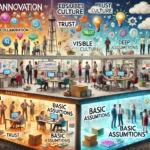Emerging Challenges and Opportunities in Organizational Behavior: The Rules Have Changed!
The world is changing at an insane speed. Technology, work styles, people’s expectations from organizations… it feels like we’re in a game where the rules keep shifting. Now, the real question is: in this new game, how should organizations adapt? How can they turn these challenges into opportunities?
If I put it simply, organizational behavior isn’t what it used to be. The old-school management models, where the boss gives orders and everyone follows, just don’t work anymore. Nobody wants to sit through endless meetings, deal with rigid rules, or work under managers who don’t listen. People today expect organizations to respect them, invest in their growth, and create a workplace that actually feels good to be in.
But let’s flip the perspective for a moment: these changes aren’t just challenges—they’re incredible opportunities! Organizations that recognize and adapt to these trends will grow faster and achieve better results. So, let’s break down some of the biggest emerging challenges and opportunities in organizational behavior.
Globalization and Multicultural Teams
🔹 The Challenge:
Borders don’t mean much anymore. More companies are building teams where employees come from different countries, bringing diverse cultures, perspectives, and expectations. This can be tricky—miscommunication, misunderstandings, and cultural clashes can make collaboration difficult.
🔹 The Opportunity:
But if an organization can turn this diversity into a strength, amazing things happen. Multicultural teams tend to be more creative, generate innovative ideas, and help companies compete better in international markets. The key is to create a culture that embraces and leverages these differences rather than seeing them as obstacles.
Technology and the Digital Revolution
🔹 The Challenge:
AI, automation, remote work… all of these are transforming organizational behavior. Tasks that used to be handled by people are now automated, making employees worry about job security or their ability to keep up with technological shifts.
🔹 The Opportunity:
But technology isn’t just a threat—it’s a launchpad for success! Companies that know how to use digital tools increase efficiency and create happier workplaces. Remote work, for example, allows employees more flexibility, which leads to higher motivation and creativity. Who said great work can only happen in an office?
Diversity, Equity, and Inclusion (DEI) Matter More Than Ever
🔹 The Challenge:
People today expect organizations to care about social issues. Employees want to work in places that value gender equality, fair treatment, and respect for cultural differences. If a company only focuses on making profits and ignores these values, it will start losing its best talent—fast.
🔹 The Opportunity:
Research shows that organizations that prioritize diversity and inclusion perform better. Why? Because when teams are diverse, different perspectives come together, leading to better decisions and more innovative solutions. It’s time for businesses to embrace this and create work environments where everyone feels valued.
Employee Well-Being and Work-Life Balance
🔹 The Challenge:
Work habits have changed, and nobody wants to be stuck in a 9-to-5 office routine anymore. The new generation of employees values work-life balance and mental well-being more than ever. Companies that still expect employees to be “always available” are setting themselves up for high burnout rates and high turnover.
🔹 The Opportunity:
Organizations that invest in work-life balance see happier, more productive employees. When companies allow flexibility and trust their employees to manage their schedules, they don’t just improve well-being—they also boost innovation and job satisfaction.
Leadership Is Changing: From Control to Inspiration
🔹 The Challenge:
The era of strict, controlling bosses is over. Employees today don’t just want to follow orders—they want to be involved in decision-making, feel a sense of purpose, and grow within their roles.
🔹 The Opportunity:
Leaders who shift from command-and-control to inspiration and empowerment will win the game. When a leader focuses on mentoring, guiding, and enabling their team, they build a strong, motivated, and engaged workforce that’s willing to go the extra mile for the organization.
Who Will Own the Future of Work?
Organizational transformation is no longer optional—it’s a necessity. Companies that fail to adapt to these changes are doomed to struggle. But on the flip side, those that embrace these challenges and turn them into opportunities will thrive.
If an organization can build a flexible, people-first, and inspiring culture, employees will love working there, and the company’s results will skyrocket. This is a new game with new rules—and only those who learn them fast will win.
So, where does your organization stand? Are you in the winning category or the losing one?










